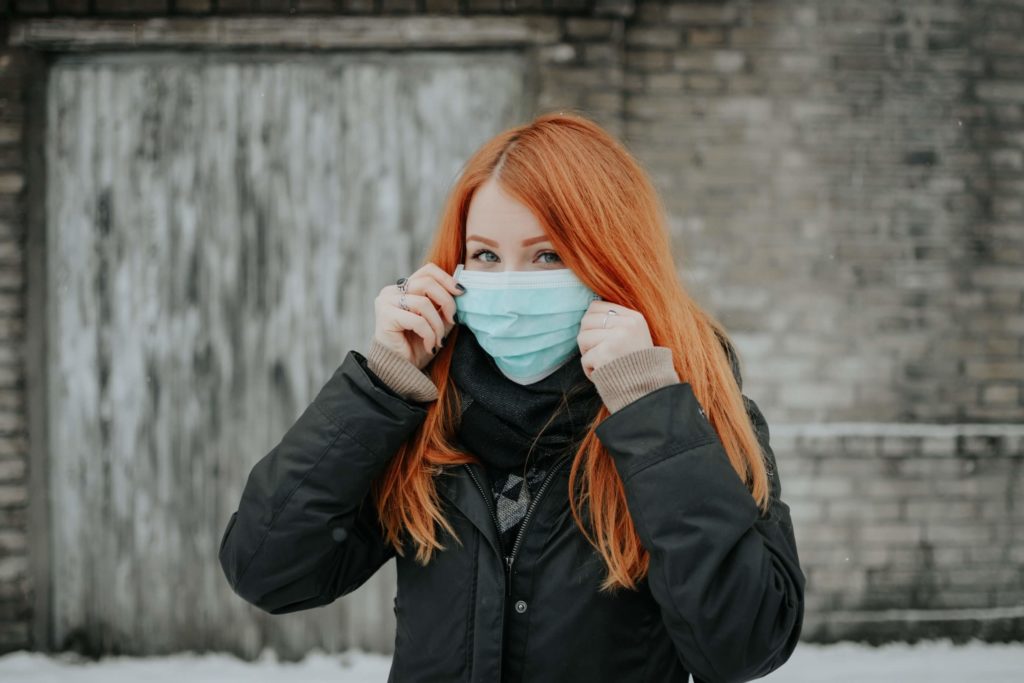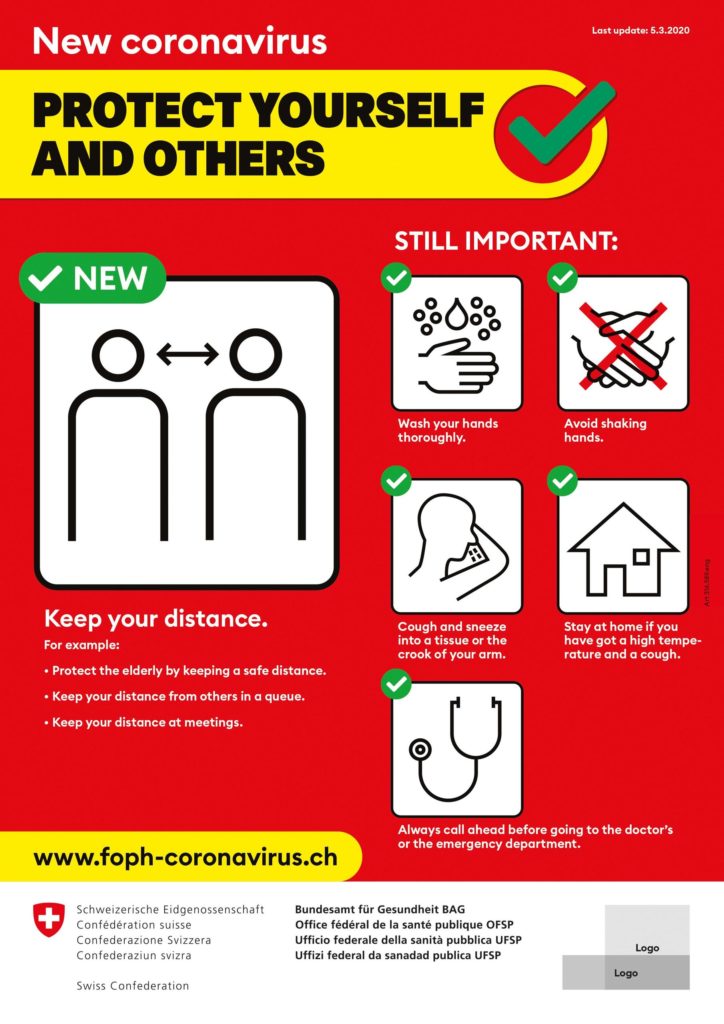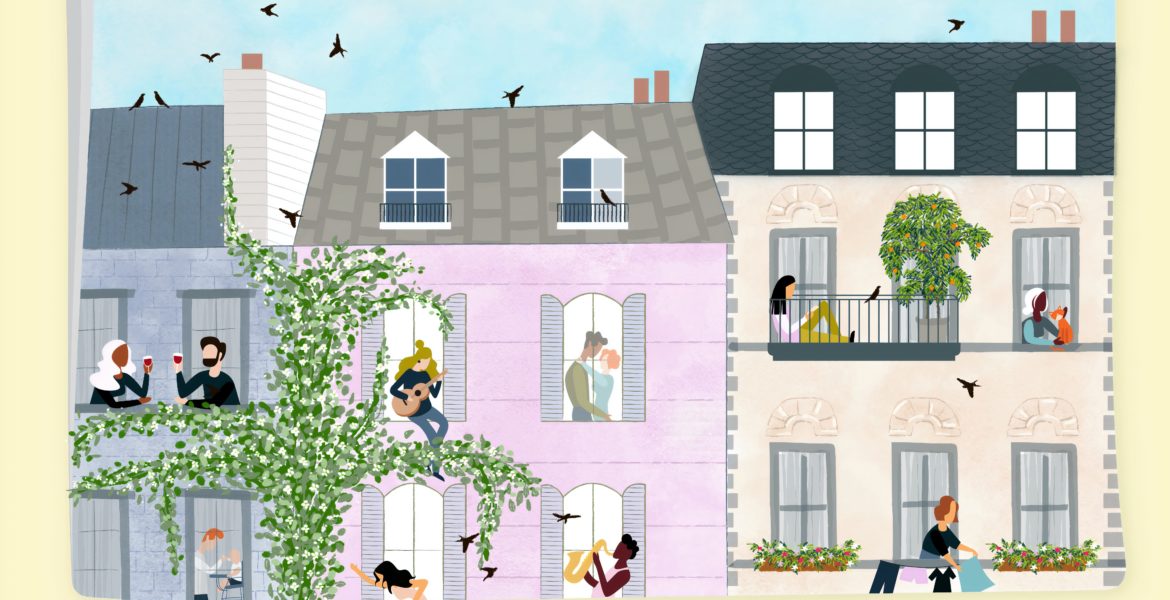*The statistics given in this report get updated in real-time.
Switzerland reported its first case of coronavirus on February 25th with the peak dating back on the 20th-21st of March with approximately 1400 new cases. However, since then, the recovery rate from the virus is 90%.
As of the 26th of May, the number of infected people has reached 30,746, with the number of fatalities being 1,913, and the number of people recovered 28,200.
The Federal Council calls for citizens to avoid public spaces and stay at home especially if you have any symptoms such as high temperature, cough, or shortness of breath. These precautions help to limit the spread of the virus as much as possible and prevent the healthcare system from getting overloaded.
Switzerland closed its borders on March 25th, with only residents, citizens, and cross-border workers allowed in. The Federal Council gradually started to ease the measures from April 27th, where hospitals resumed all medical procedures and medical practices. Also, service businesses like hairdressers, massage practices, cosmetic studios, DIY stores, garden centers, and florists reopened.
CORONAVIRUS CASES |
30,746 |
DEATHS |
1,913 |
RECOVERED |
~28,200 |
ACTIVE CASES |
~633 |
DEATH RATE |
6.22% |
RECOVERY RATE |
91% |
GLOBAL INFECTION SHARE |
0.54% |
Source: TDG
There is a coronavirus Infoline (+41 58 463 00 00) available 24/7, but you may experience delays in getting through due to the high volume of calls.
Below in this interactive map, you can see the cases of infection and deaths in the Swiss cantons:
Coronavirus in Switzerland: Statistics
Switzerland reported its first case of coronavirus on Tuesday, the 25th of February. The first person confirmed of being infected was a man from the Italian-speaking canton of Ticino, who had previously visited Milan.
The first death was reported on Thursday, March 5th. The woman was from the Vaud canton and had previously suffered from a chronic disease.
Fatalities by Coronavirus in Swiss Cantons
The rate of deaths from the coronavirus in Switzerland started to slow down by March 20, moving from over 30 percent of new deaths a day to just 15 percent on 30 and 31 March. At the end of April, the percentage decreased to 5.78%.
The most affected cantons by COVID-19 have been Vaud, Ticino, Zurich, and Geneva.
See below in this interactive map the number of fatalities in the Swiss cantons:
Current Situation in Switzerland: Latest Updates
April 27, Monday
- Non-emergency operations that were set aside to focus on coronavirus patients are set to be resumed today. In the French-speaking part, several thousand people are waiting to be operated on.
- The government has decided not to impose a general obligation for the public to wear face masks as it relaxes restrictions.
- The number of people recovered from the virus has reached the number of 21,800.
April 26, Sunday
- Approximately 56,000 people have been turned away from crossing the Swiss border while 150 fines of CHF100 have been issued to people who had breached the restrictions.
- Switzerland recorded 167 new cases of coronavirus in one day, slightly less than the day before.
April 25, Saturday
- In Fribourg, the nursing staff has been offered a bonus of 1,000 francs as a reward for their work. The bonus was given in the form of vouchers to be consumed in local shops or restaurants.
April 24, Friday
- In an interview broadcast in the NZZ, The President of the Swiss Academy of Sciences Marcel Tanner said that he believes that there will be no major events like concerts or matches before 2021.
April 23, Thursday
- The crisis has impacted Ticino, Geneva, and Vaud to have a record of the most deaths per week since the year 2000.
- The Corona Immunitas program, which was created by the Swiss School of Public Health, created as a public-private partnership with the backing of the Swiss government, has begun collecting blood samples and interviewing people across Switzerland to determine what proportion of the population has antibodies to the novel coronavirus, and their level of immunity.
- The Federal Office of Public Health (FOPH) issued updated guidance on Thursday that allows hotels to open a range of services which include bars, saunas and wellness centers, spas, and bike rental outlets. These facilities cannot be accessed by the general public.
April 3rd, Friday
- With the implementation of strict rules due to the pandemic, employees were forced to start teleworking and have discovered its advantages. It is expected of employers to prepare to implement working from home even after the crisis.
- The Swiss Conference of Cantonal Directors of Public Education (CDIP) adopted common measures that the current school year will not be extended, and the vacations will not be substituted for teaching. The school calendars will remain valid as well.
April 2nd, Thursday
- Even though the admissions in intensive care have been more regular and there are fewer available beds, there has not been a big increase in additional critically ill patients. The situation in the most affected canton, Ticino, differs greatly from others.
- On Thursday, a “drive-in” testing will be opened in the canton of Bern in collaboration with the Swiss Red Cross. There will be 200 to 300 tests conducted daily, where people can be tested while staying inside their vehicles. The individuals will not need a medical prescription, but instead, fill in an online questionnaire in order to obtain a ticket.
April 1st, Wednesday
- The Chaîne du Bonheur stated that a donation of up to 800,000 francs will be given to regional associations of OSEO (Swiss Aid for Workers), cantonal and intercantonal organizations of Pro Senectute. This donation will be used to support the families affected by the coronavirus in Switzerland.
March
- Switzerland became the fifth country in Europe to surpass 10,000 recorded cases of coronavirus.
- Out of the people tested, one in ten people have tested positive for the virus.
- The first drive-through testing for coronavirus in the country will open today in Lucerne, Switzerland. People who are concerned need a referral from a doctor in order to require a test.
- During a press conference, Patrick Mathys, Head of the Crisis Management, reported that around 8,000 tests are being conducted daily in Switzerland and so far there have been around 71,000 negative tests.
- The president of SSICM, Thierry Fumeau, reported that patients with a good chance of treatment success are going to be prioritized, taking into account their pre-existing health condition, and not necessarily their age.
- Swiss officials have warned that the country was facing a shortage of tests for the virus.
- For the first time since 1939, thousands of army reservists have been called up to help with the coronavirus, where the army has been able to mobilize up to 8,000 hospital personnel.
- Over 1,273 new cases have been reported, and 18 new deaths. This means the cases have increased by 25 percent in just one day.
- The Swiss government announced a range of steps to minimize the impact of the coronavirus. Such measures are the ban on group gatherings of more than five people in all public spaces and the fact that online shops will now be allowed to deliver groceries over the weekend.
- The Swiss Interior Minister, Berset, announced that 32 billion francs would be made available to support those affected by the coronavirus, bringing the total to CHF40 billion.
- Switzerland’s executive body issued a recommendation for all residents to stay at home, with the expectations of those residents who cannot work from home, those who need to pick up medication or visit the doctor, and people who need to visit markets for food and essentials.

- Daniel Koch of the Health Office said that the state is unable to report in real-time due to the fast rise of new cases.
- The Swiss government instituted a ban on all private and public events, with schools closing nationwide until April 19.
- The government decided to get border checks with Germany, France, and Austria. Only Swiss citizens, Swiss residents, and people traveling to Switzerland for business are allowed to enter the country.
- The Swiss canton of Geneva took measures in the face of the coronavirus pandemic. All gatherings of more than five people are banned indoors and outdoors.
- The canton of Geneva temporarily banned prostitution to help with the spread of the new coronavirus.
- The parliament announced the interruption of spring session due to the “rapidly worsening coronavirus situation” in Switzerland.
- The Federal Council decided to ban events with more than 100 people, until the end of April.
- The Federal Council took measures in order to help the economy. Around CHF 10 billion was offered for emergency aid in a wide variety of areas such as unemployment insurance funds and affected companies.
Swiss Government Measures
On March 13, the government closed schools and several universities throughout the country. Also, border controls are set in motion, allowing only swiss citizens, those who have residence permits, and people who need to travel for their profession.
Even though the Federal Council has authorized a certain relaxation of the measures as long as strict protective measures are put in place social distancing should be practiced still.
The Federal Council has extended the ban on gatherings in public spaces of more than five people until May 10th. If five or fewer people meet, they must maintain a distance of two meters from one another.
Coronavirus in Switzerland: FAQs
A lot of people have questions regarding travel, diagnosis, and protection among other things. Here are some of the answers we could provide.
Will health insurance pay for Swiss residents’ COVID-19 tests?
The Swiss government announced that diagnostic tests for coronavirus will be covered by compulsory Swiss health insurance up to a maximum of CHF 280.
What are the symptoms of coronavirus disease?
The most common symptoms are a high temperature, a cough and difficulty breathing, but they can vary in their severity. Some patients may have nasal congestion, conjunctivitis, runny nose, sore throat or diarrhea. These symptoms begin gradually.
Is there a vaccine, drug or treatment for COVID-19?
Not yet but possible vaccines and some specific drug treatments are under investigation. WHO is coordinating efforts to develop vaccines and medicines to prevent and treat COVID-19.
What should people with higher risk of illness do if they have COVID-19?
Keep precautions and try social distancing, stock up on food, stay home. Get essential supplies like medication and over-the-counter medicine in case you start to show any symptoms. Get more detailed information here.
How You Can Protect Yourself and Others

The best and most efficient way to protect yourself and others is to keep your distance from groups of people. Leave space between you and the person in front of you when standing in line at checkouts. If possible, walk or ride to work. Wash your hands as often as possible, before and after preparing food, before contact with children and immediately when you come home. For a thorough step-by-step on how to wash your hands properly check out this video.
Take care and stay safe!



there is something wrong with your figures!!
Coronavirus Cases = 19’303
Recovered = 4’846
Deaths = 575
Left over/rest/active cases ??? =13,882
Why doesn’t your site show this information for complete transparency?
There are other sites that break it down. It looks alarming to read 19,303 cases when in fact there is a hole in the statistics supplied.
have a good weekend.
Thank you for your suggestion. We have added a section only for active cases.